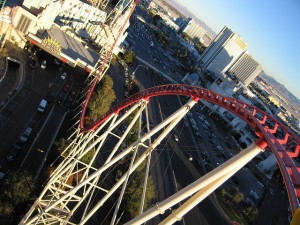
Photo cred: AMagill
Just as the original Game Boy defined most of my childhood, RollerCoaster Tycoon became the center of my universe around 1999 as I began to discover a brand new world of computer games.
For those not familiar, RollerCoaster Tycoon allowed users to build and manage virtual theme parks (awesome, right?). The possibilities were seemingly endless, and I designed the most ridiculous coasters I could dream up, paired alongside other attractions such as ferris wheels, swinging ships and entertainers in costumes. My job was to keep my approval rating up (as determined by visitors) and build an exciting, functional park.
But it wasn’t all rainbows and unicorns in the world of RollerCoaster Tycoon, and I soon discovered that theme park essentials like trash cans, bathrooms and security could quickly make or break my success. As I think about the lessons learned during game play, I can’t help but find parallels to my world today in community management. Here are a few key takeaways from my experience:
It’s not easy to build something from scratch.
In RollerCoaster Tycoon, you simply start with a patch of grass and the tools you need, and build your park from the ground up. You do things like plant flowers, mow the lawns and sweep the paths to help it appear attractive and inviting, and hope that visitors start coming through the front gate. You trouble-shoot early on, and try to avoid future problems. The more people that pile in and have good experiences, the more likely others will be to flock to your theme park.
Sometimes in your role as a community manager, you’ll be asked to build a community. From square one. But where do you start? David Spinks has written about how to build one from scratch, and, as he asserts, it starts one person at a time. You may stumble a bit in the beginning and follow paths that turn out to be dead-ends—and that’s OK. Maybe your members don’t like to engage on Twitter. Maybe most of them are on Reddit. The mark of a good CM is a person who is scrappy and creative, and willing to rummage around in the dark a bit before finding the light.
If you don’t take care of your community, it’ll throw up on you.
In the game, it was imperative to meet the needs of all guests, including things like benches, information booths and building proper paths to and from each of your attractions. If not carefully planned, visitors might wander around aimlessly or lose their lunch after a particularly intense ride. Soon, others begin to experience the same frustrations, and your park’s approval rating plummets.
It’s no different when you’re a community manager: It’s your job to provide the necessary tools, content and resources to allow your “visitors to flourish. They might not throw up if their needs aren’t met, but they’ll do the online equivalent, such as posting their displeasure on your Facebook wall or sounding off on Twitter. Other members notice, and we’ve all read the horror stories about the mob mentality that can quickly spiral out of control. Take ownership over the community, and address their needs on a daily basis. If you need to take a break and we all know that CMs need vacations, too designate someone who will nurture members while you’re away, so issues can be addressed in a timely manner.
Take calculated risks.
Park visitors are finicky when it comes to the thrills they’re seeking. Some want that heart-stopping, epic drop over the first hill, while others would prefer a less intense but still exciting approach. In the game, if you were too hasty, it also was possible to build a ride that wasn’t structurally sound, sending your visitors plunging to their deaths (morbid, I know), and no doubt negatively impacting the park’s popularity.
As a community manager, it’s important to be consistent in your content and approaches in order to achieve balance. At the same time, it doesn’t hurt to change things up every once in awhile to stimulate discussion and avoid putting your members to sleep. But it’s all about knowing your community. If you pluck something out of left field or start becoming too sales-y, your members will take their time and their business elsewhere. Not sure what they need or want from you? Ask them. They’ll tell you.
It’s tough to decide what’s more fun managing a strong community or managing a virtual theme park (we’re talking about rollercoasters, for crying out loud!). But one thing’s for sure: each has its own unique set of challenges, and both tasks are incredibly rewarding.
Erica Moss is the community manager for the online Masters in Nursing program at Georgetown University. She adores Instagram, University of Michigan football and her English bulldog, Mona. Follow her on Twitter @ericajmoss.


This is one of my favorite posts that I have read on CM because I can relate so much!
Â
Thank you for sharing Erica Moss!
 @jprastrullo That makes me so happy! The idea came to me randomly the other day, and I had a lot of fun writing it. 🙂
Wow, wow, wow. Building bathrooms and info booths (and the occasional concession stand!) is SO.IMPORTANT. What an illustrative reminder, Erica! This one will definitely stick with me.Â
 @caligater Thanks, Cali! I’ve definitely had the urge to play the game again since writing and sharing this post. 😉